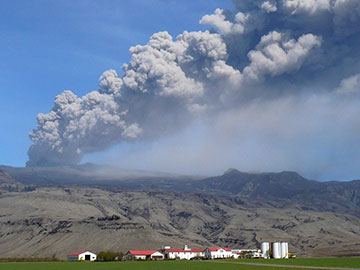The work of Bristol’s Volcanology Research Group has been applied across the globe to reduce a variety of risks posed by active volcanism. This includes:
- Responding to the 2010 Icelandic ash crisis. Researchers from the group played a key advisory role following the eruption of Eyjafjallajökull. Volcanic hazards are now explicit in the UK National Risk Register and the risk to aviation has been significantly reduced; ash clouds are better understood, monitored and predicted due to the implementation of the group’s research findings. Their free web tool, PlumeRise, which gives more accurate estimates of the amount of ash injected into the atmosphere during a volcanic eruption, is now used by numerous institutions worldwide.
- Forming the Global Volcano Model Network (GVM). The group led the formation of the GVM which provides systematic evidence, data and analysis of volcanic hazards and risk on global and regional scales, and supports Volcano Observatories at a local scale. Members of the team developed the LaMEVE database that spans the last 2.5million years of large magnitude explosive eruptions. Freely available online since 2012, the database has enabled the development of a global magnitude frequency relationship which will help facilitate risk assessment of future large magnitude eruptions.
- Volcanic risk reduction – improving hazard management and emergency response planning. In response to the crisis at the Soufrière Hills volcano in Montserrat which started in 1995, researchers developed novel methods for assessing volcanic hazard and risk. Their research informed the re-development of housing on the island, as well as economic activities such as the mining of sand, and has ultimately enabled the community to remain on the island. The researchers are now working with volcano observatories, local and national governments and NGOs to produce risk assessments for high risk volcanoes, improve preparedness for volcanic emergencies and build resilience in surrounding communities.
- Monitoring the world’s forgotten volcanoes from space. Only a small number of the world’s known volcanoes are monitored from the ground so the team are developing satellite monitoring tools to identify signs of volcanic unrest. This work has been piloted using volcanoes in Ethiopia which are not monitored locally and have no risk assessment but are showing signs of activity. Data generated are also being used to help inform the geothermal energy sector, improve geothermal production and reduce the uncertainty and risk associated with geothermal energy development.
- Understanding the risks of geoengineering as a strategy for reducing the risk from climate change. The SPICE project (Stratospheric Particle Injection for Climate Engineering) has been investigating the effectiveness of a theoretical category of geoengineering called Solar Radiation Management (SRM) in which attempts are made to control global temperatures by reflecting incoming shortwave radiation. The project has provided valuable understanding that is helping inform decision-makers and stakeholders about the feasibility of this technique and the major environmental and social impacts its deployment might have.
The announcement was made tonight [Thursday 19 November] at a reception at St James’s Palace, which was attended by Professor Hugh Brady, Vice-Chancellor and President of the University of Bristol and Dr Matt Watson, Reader in Natural Hazards in the School of Earth Sciences.
Professor Brady said: “The University is delighted to receive such a prestigious award which recognises the deep and far-reaching impact of research carried out by Bristol scientists.
“The work of our volcanology research group has had real and lasting impacts throughout the world, making people’s lives safer, contributing to more resilient societies, ensuring safer international travel and protecting essential infrastructure.”
Professor Katharine Cashman, head of the Volcanology Research Group said: “This is a real honour not only for the volcanology group, but also for all of our colleagues at the University of Bristol, in the UK and in the international community, who are committed to working together to improve our resilience to volcanic hazards around the world.”
The Queen will present the prestigious accolade, which is part of the UK’s national Honours system, to the University during a ceremony at Buckingham Palace next year.
In this 11th round of the prestigious awards, 21 UK universities and colleges were awarded Prizes recognizing a wide range of innovative work across many different disciplines.
Jo Johnson, Minister for Universities and Science said: “The UK is a world leader in science and research and The Queen’s Anniversary Prizes celebrate the achievements of our universities and colleges. The outstanding academics recognised with these awards bring benefits to the everyday lives of millions of people in the UK and deserve this high honour for their work.”
The Queen’s Anniversary Prizes are awarded every two years to universities and colleges who submit work judged to show excellence, innovation, impact and benefit for the institution itself and for people and society generally in the wider world. Established in 1993, they are organised by the Royal Anniversary Trust.
